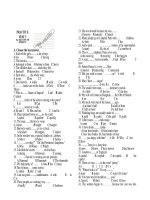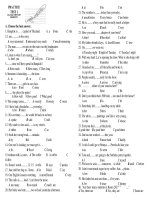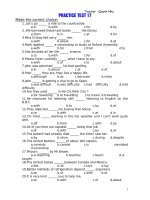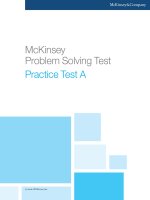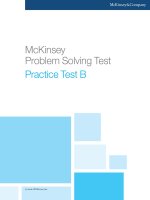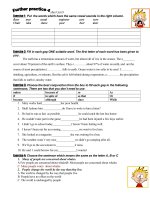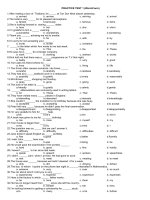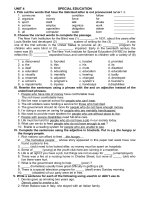practice Test
Bạn đang xem bản rút gọn của tài liệu. Xem và tải ngay bản đầy đủ của tài liệu tại đây (90.56 KB, 3 trang )
<span class='text_page_counter'>(1)</span><div class='page_container' data-page=1>
<b>ENGLISH PRACTICE TEST</b>
<i><b>Choose the word whose underlined part is pronounced differently from the rest.</b></i>
<b>Question 1: A. laughs </b> <b>B. coughs</b> <b>C. ploughs </b> <b>D. photographs </b>
<b>Question 2: A. great</b> <b>B. feat</b> <b>C. seat</b> <b>D. beat</b>
<b>Question 3: A. laughed </b> <b>B. talked</b> <b>C. established </b> <b>D. contained </b>
<i><b>Read the following passage and mark the letter A, B, C or Don your answer sheet to indicate the correct answer for each of the</b></i>
<i><b>answer from 4 to 8.</b></i>
How can scientists predict earthquakes? Earthquakes are not scattered anywhere but happen in certain areas. They happen in places
where pieces of the earth’s surface meet. This pattern causes them to shake the same places many times. Foe example, earthquakes
often occur on the west-coast of North and South America, around the Mediterranean Sea, and along the Pacific coast of Asia.
Another way to predict earthquakes is to look for changes in the earth’s surface, like a sudden drop of water level in the
ground. Some people say animals can predict earthquakes. Before earthquakes people have been chickens sitting in the trees, fish
jumping out of the water, snakes leaving their holes and other animals acting strangely.
After an earthquake happens, people can die from lack of food , water, and medical supplies. The amount of destruction
caused by an earthquake depends on where it happens, what time it happens, and how strong it is. It also depends on types of building,
soil conditions and population. Of the 6000 earthquakes in the earth each year, only about fifteen cause great damage and many
deaths.
<b>Question 4: The passage mainly discusses ...</b>
<b>A. how to predict earthquakes</b> <b>B. how strong earthquakes are</b>
<b>C. the damage caused by earthquakes</b> <b>D. strange animal behaviors </b>
<b>Question 5: After an earthquake, as a result of ... people can die.</b>
<b>A. lack of friendship</b> <b>B. lack of information</b> <b>C. lack of knowledge</b> <b>D. lack of food </b>
<b>Question 6: Looking for ... can help predict earthquakes.</b>
<b>A. water currents</b> <b>B. drops of water</b>
<b>C. changes in the earth’s surface</b> <b>D. water beneath the earth’s surface </b>
<b>Question 7: Earthquakes happen in certain areas where...</b>
<b>A. many buildings are built</b> <b>B. pieces of the earth’s surface meet. </b>
<b>C. the soil conditions are stable</b> <b>D. the population is large</b>
<b>Question 8: Earthquakes often happen along...</b>
<b>A. the east-coast of North America</b> <b>B. the coast of Australia</b>
<b>C. the Pacific coast of Asia</b> <b>D.. the east-coast of South America</b>
<i><b>Mark the letter A, B, C, or D on your answer sheet to show the underlined part that needs correction. </b></i>
<b>Question 9: I hope they will repair this road by the time we come back next summer.</b>
<b> A B C D</b>
<b>Question 10: I’m not used to go to school late. I prefer punctuation.</b>
<b> A B C D</b>
<b>Question 11: The students are going to hearing three short conversations about food.</b>
<b> A B C D</b>
<b>Question 12: If I want a job at the factory, who do I apply for?</b>
<b> A B C D</b>
<b>Question 13: These televisions are all too expensive for we to buy at this time, but perhaps we will return later.</b>
<b> A B C D</b>
<i><b>Read the following passage and mark the letter A, B, C, or D on your answer sheet to indicate the correct word for each of the</b></i>
<i><b>blanks from 14 to 18. </b></i>
Nowadays people are more aware that wildlife all over the world is in danger. Many species of animals are threatened, and
could easily become (14)...if we do not make an effort to protect them. There are many reasons for this. In some cases, animals
are hunted for their fur or for other valuable parts of their bodies. Some birds, (15)...as parrots are caught alive and sold as pets.
For many animals and birds, the problem is that their habitat-the place where they live-is disappearing. More (16)...is used for
farms, for houses or industry, and there are fewer open spaces than there once were. Farmers use powerful chemicals to help them
grow better crops, but these chemicals pollute (17)...environment and harm wildlife. The most successful animal on earth-human
beings-will soon be the only ones left, (18)...we can solve this problem.
<b>Question 14:</b> <b>A. empty</b> <b>B. extinct</b> <b>C. lost</b> <b>D. disappeared</b>
<b>Question 15: </b> <b>A. where</b> <b>B. or</b> <b>C. like</b> <b>D. such</b>
<b>Question 16: </b> <b>A. land</b> <b>B. area</b> <b>C. earth</b> <b>D. soil</b>
<b>Question 17: </b> <b>A. that</b> <b>B. an</b> <b>C. the</b> <b>D. a</b>
</div>
<span class='text_page_counter'>(2)</span><div class='page_container' data-page=2>
<i><b>Choose the word whose main stress is placed differently from the others.</b></i>
<b>Question 19: A. penalty</b> <b>B. wilderness</b> <b>C. opponent</b> <b>D. podium </b>
<b>Question 20: A. priority</b> <b>B. deforestation</b> <b>C. rhinoceros</b> <b>D. endangerment </b>
<i><b>Mark the letter A, B, C, or D on your answer sheet to indicate the correct answer to each of the following questions. </b></i>
<b>Question 21: It is believed that the man escaped in a stolen car.</b>
<b> A. The man is believed to be escaped in a stolen car. </b>
B. The man is believed to have escaped in a stolen car.
<b> C. The man was believed to be escaped in a stolen car.</b>
<b> D. They believed that the man stole the car.</b>
<b>Question 22: “ Don’t forget to phone the police,” she said.</b>
<b> A. She reminded him to phone the police. </b>
<b> B. She told him to forget not to phone the police.</b>
<b> C. She reminded him about phoning the police.</b>
<b> D. She reminded him not forget to phone the police.</b>
<b>Question 23: The last time when I saw her was three years ago.</b>
A. I saw her three years ago and will never meet her again.
B. About three years ago, I used to meet her.
C. I have often seen her for the last three years.
<b> D. I have not seen her for three years.</b>
<b>Question 24: I like tea more than coffee.</b>
<b>A. I like coffee as you do.</b> <b>B. I prefer tea to coffee </b>
<b>C. I like coffee better than tea.</b> <b>D. I like tea very much.</b>
<b>Question 25: We did not visit the museum because we had no time.</b>
<b>A. If we had had time, we will visit the museum.</b>
<b>B. If we have time, we will visit the museum.</b>
<b>C. If we had had time, we would have visited the museum.</b>
<b>D. If we had time, we would visit the museum.</b>
<i><b>Mark the letter A, B, C, or D on your answer sheet to indicate the correct answer to each of the following questions. </b></i>
<b>Question 26: Jack, ………….. I played tennis yesterday, was much fitter than me. </b>
<b>A. with who </b> <b>B. who</b> <b>C. whom</b> <b>D. with whom </b>
Question 27: We visited the church …………... in the 18th<sub> century. </sub>
<b>A. that was built </b> <b>B. which was built </b> <b>C. built</b> <b>D. All are correct</b>
<b>Question 28: Some rare animals are in danger of………..</b>
A. extinction <b>B. extinguishing</b> <b>C. extinguish</b> <b>D. extinct </b>
<b>Question 29: Ann: “______ where the nearest post office is?”</b>
Linda: “Turn left and then turn right.”
<b>A. Do you tell me</b> <b>B. Should you show me</b>
<b>C. Will you say me</b> <b>D. Could you tell me </b>
<b>Question 30: He ……… from Danang university before he got married</b>
<b> A. has graduated</b> <b>B. graduates</b> <b>C. had graduatedD. graduated</b>
<b>Question 31: The boy_____ by the teacher yesterday.</b>
<b>A. punish</b> <b>B. punished</b> <b>C. punishing</b> <b>D. was punished </b>
<b>Question 32: Choose the best answer which is the same meaning as the word underlined</b>
- Because of the fog,the flight was delayed for several hours.
<b>A. began</b> <b>B. held up</b> <b>C. continued</b> <b>D. started </b>
<b>Question 33: - “I’ve passed my driving test.”</b>
- “______”
<b>A. Do you?</b> <b>B. That’s a good idea.</b> C. It’s nice of you to say so. D. Congratulations!
<b>Question 34: Why didn’t you attend the meeting?</b>
- Oh, I did not know. If I_____, I_____ there.
<b>A. know / would come</b> <b>B. had known / will come</b>
<b>C. had known / would have come</b> <b>D. known / had come</b>
<b>Question 35: John is not at home. He _____ go somewhere with Daisy. I am not sure. </b>
<b>A. must </b> <b>B. will</b> <b>C. might</b> <b>D. should </b>
<b>Question 36: They establish wildlife reserves ……….. the species can survive and develop.</b>
<b>A. because of</b> <b>B. such as</b> <b>C. in order to</b> <b>D. so that</b>
<b>Question 37: We went by ……….. train to the west of England.</b>
<b>A. a</b> <b>B. an</b> <b>C. the</b> <b>D. Ø</b>
</div>
<span class='text_page_counter'>(3)</span><div class='page_container' data-page=3>
<b>A. the better results </b> <b>B. the results are better </b>
<b>C. the more better results </b> <b>D. the best results</b>
<b>Question 39: The woman asked……… get lunch at school.</b>
<b>A. can the children </b> <b>B. whether the children could </b>
<b>C. If the children can </b> <b>D. could the children</b>
<b>Question 40: “ How many pages……… so far?”</b>
<b>A. have you studied </b> <b>B. did you study </b> <b>C. do you study </b> <b>D. had you studied</b>
<b>Question 41: Why does the telephone always ring--- you’re having a bath?</b>
<b>A. during </b> <b>B. for </b> <b>C. while </b> <b>D. on</b>
<b>Question 42: That lady is --- one in this club.</b>
<b>A. prettier </b> <b>B. more pretty</b> <b>C. the prettiest</b> <b>D. most pretty</b>
<b>Question 43: She’s going to let me --- her shoes.</b>
<b>A. to borrow </b> <b>B. borrowing </b> <b>C. borrow </b> <b>D. borrowed</b>
<b>Question 44: In water polo, a player is ……… after committing five personal fouls.</b>
<b>A. ejected</b> <b>B. punished</b> <b>C. criticized</b> <b>D. defeated</b>
<b>Question 45: I haven’t heard from my </b>
<b>son---A. for several weeks </b> <b>B. for several weeks ago </b>
<b>C. since several weeks before </b> <b>D. since a long time</b>
<b>Question 46: To my ………., John is very good at Vietnamese.</b>
<b>A. amazed</b> <b>B. amazement</b> <b>C. amaze </b> <b>D. amazing </b>
<b>Question 47: ……., he won a lot of money in a lottery.</b>
<b>A. luck </b> <b>B. luckily</b> <b>C. lucky </b> <b>D. unlucky</b>
<b>Question 48: His grandmother died…………..the age of 90</b>
A. of <b>B. in</b> <b>C. at</b> <b>D. on</b>
<b>Question 49: We were made………fifty new words every week.</b>
<b>A. for learning </b> <b>B. learning </b> <b>C. to learn </b> <b>D. learn </b>
<b>Question 50: Tom: “How did you get here?”</b>
John: “______”
</div>
<!--links-->

